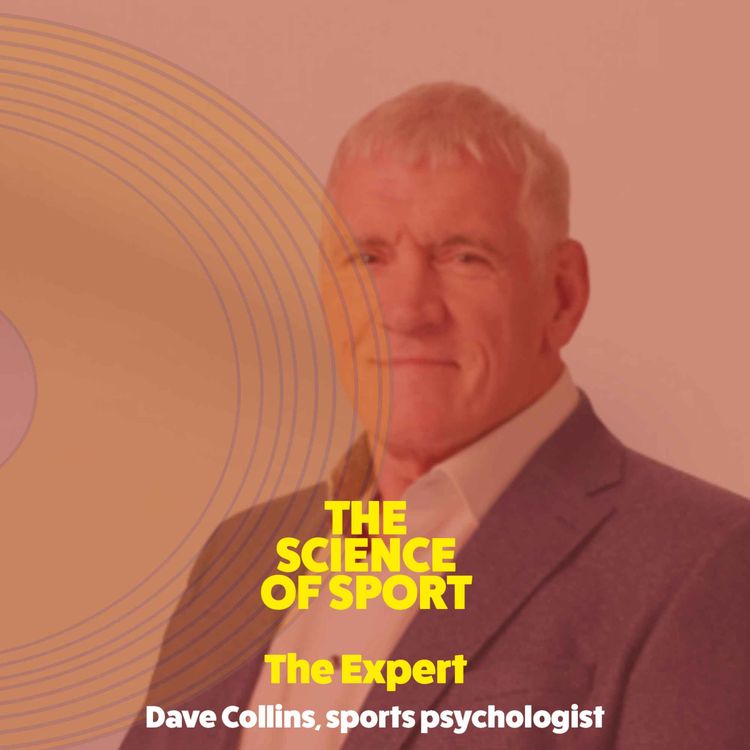Share

The Real Science of Sport Podcast
Does Talent Need Trauma To Succeed? A Sports Psychologist Weighs In
Dave Collins is a sports Performance Psychologist who has coached over 90 World or Olympic medallists and professional sports teams and performers. The team delve into the concept of what makes great sporting champions, whether trauma is an essential ingredient and how competition and disappointment play a role in long terms success. Collins is a Professorial Fellow at the University of Edinburgh and Director at Grey Matters Performance Ltd. As an academic, he has over 450 peer review publications and 90 books or chapters. As a practitioner, he has worked with over 90 World or Olympic medallists plus professional teams and performers. Collins has coached to national level in three sports, has a fifth dan in karate, has worked as Director of the Rugby Coaches Association and is a Fellow of the Society of Martial Arts and BASES, Associate Fellow of the BPS and an ex Royal Marine.
SHOW NOTES
The Rocky Road paper that introduced the “talent needs trauma” concept
Champions vs Super Champions: Expanding on the concept of challenge to create champions
A lay article on the concept outlined in the Rocky Road paper
More episodes
View all episodes

WINTER OLYMPIC SPECIAL: An Insiders Guide to Cross Country Skiing and Biathlon
01:32:33|Norwegian Oyvind Sandbakk is a specialist in the brutally tough world of cross-country skiing and biathlon. As a Professor with the Department of Neuromedicine and Movement Science at the Norwegian University of Science and Technology and a Director for the Centre for Elite Sports Research, Oyvind - himself a World Cup cross-country skier - has worked with many of Norway's top athletes in these sports. Oyvind delves into the technical details of both disciplines (including the dark art of waxing!), the gear involved in both sports, the physiology required to be one of the best in the world and what to watch for at the 2026 Winter Olympics.
3. WINTER OLYMPIC SPECIAL: The Beauty and Drama of Figure Skating
01:32:14||Season 8, Ep. 3Figure skating is one of the most popular sports at the Winter Olympics as it combines world-class athleticism with dance, choreography and music. Jackie Wong is one of the world's leading experts on figure skating and takes us behind the scenes of what it takes to be among the best in the world. From blade sharpening to music choice (the Back Street Boys will be the most popular band in Milan 2026!), figure skaters are defined by their ability to pull off daring manoeuvres with grace against the backdrop of judges watching for the smallest mistake. Wong shares some of his favourite stories from the ice, the routines and stars that have defined the sport and who, and what, to watch for in 2026. Wong is a figure skating analyst and blogs and tweets as Rocker Skating on both his website and podcast. He was a novice skater but has worked as both a judge and coach before covering the sport as an analyst and blogger from 2009.SHOW NOTESJackie's website Jackie's Podcast with co-hosts Michelle Ellis and Tara Nichols Jackie Wong (born April 11, 1982) is a figure skating analyst.[1][2] He blogs, tweets and sells merchandise as Rocker Skating as well as hosting the Ice Talk podcast at Ice Network.[3] He is based in New York.[4]Wong has worked for architectural firm Skidmore, Owings & Merrill, and is currently an associate consultant at McKinsey & Company.[5] A former novice skater who has passed the U.S. Figure Skating juvenile tests and worked as a coach and a judge, he began covering figure skating for Examiner.com in 2009.[6]He created Rocker Skating as a graduate business school project at the University of Pennsylvania in 2015 and began attracting sponsorships.[7] His commentary ranges from offering technical play-by-plays[8] to sharing his opinions on a skater's choice of costumes and music.[9]Wong has a bachelor's degree in economics and urban studies from Stanford University, a Master of Architecture degree from the University of Pennsylvania School of Design and an MBA from Penn's Wharton School.[6] He contributed to the University of Pennsylvania's biomedical research department by analyzing the movement and positions of the arms, legs and head of ice skaters and presenting them as 3D models.[10] He was selected to compete in Season 36 of "Jeopardy!"[11] and came in second place on the episode that aired May 19, 2020.[12]
The Heat is On In Aus, But Whoop Is Gone / Noakes and a Low Carb Theory Full of Holes
01:35:10|On the show, we mention our Supporters Club a lot, and reference discussions of various sports science subjects that inspire and inform our own conversations. You can be part of that, by making a monthly pledge here, which gives you access to the best sports science discussions on the interwebs! This week’s Spotlight opens in Melbourne, where brutal heat nearly derailed Jannik Sinner’s title defence. The Italian was hobbled by cramps and looked down and out before the heat index policy triggered a delay, a roof closure, and some much-needed air con. That leads us into a deep dive on cramping: why it happens, what Sinner could be doing to address this weakness, and some of the less than credible methods tennis players are using to prevent them. We also unpack another Australian Open storyline — the request for players to remove Whoop devices — exploring both credible and dubious motives for such a ban.Carbohydrates are in the news again, though this time, it's not about how much athletes are consuming, but rather how little they actually need - 10g per hour. That, according to a review headed by Prof Tim Noakes, is all that is required to prevent fatigue during exercise. We break down the paper, question its scientific robustness, explore some of the gaping holes, and explain why it diverges so sharply from real-world practice, and even from Noakes' own previous work on fatigue and performance.A rapid-fire round sweeps through listener feedback on whether ChatGPT could ever replace a coach, the retesting of decade-old samples that’s led to bans for seven athletes, more eye-catching performances from teenage phenoms, a pair of world records, and a winter Olympic controversy.And finally, we turn to Alex Honnold’s jaw-dropping, rope-free ascent of Taipei 101 — a climb that lit up the internet. Where does it sit in the history of the sport, and what made it so utterly unmissable?LinksArticle on heat issues in MelbourneReaction to the Whoop ban Down UnderNoakes et al's review article on carbohydrate requirements during exerciseOne of many articles that suggest that muscle glycogen is also important for performance, this time not as part of failure, but rather regulation. Noakes was himself an author on this oneAnother article where Noakes correctly identifies the role of glycogen in the muscle as part of how performance is regulated and improvedWe mentioned the efforts of Dr James diNicolantonio to rebut some of the poor science of the low carb review. Here is one of many threads that offer counterpointsA good study from friends of the pod Louise Burke and Jaime Whitfield on what actually happens to performance on a low carb dietOne of a few systematic reviews on the low carb vs high carb nutrition models for exercise performanceAthletes test positive ten years after the 'crime'"I'm going to burn the whole of track and field down". Well, do it already, stop hinting
2. Alex Hutchinson: The Battle For Credibility
01:16:50||Season 8, Ep. 2Journalist, author, and speaker Alex Hutchinson is passionate in his search for truth. As the author of three books ('Which Comes First, Cardio or Weights?, 2011; 'Endure', 2021 and 'The Explorers Gene', 2025) and writer of the popular Sweat Science blog, the former Physics graduate is at the forefront of modern science journalism. Hutchinson, a former Canadian national team miler, explains his journey to becoming one of the most respected voices in his field, how he balances credibility and relevance in a cluttered social media landscape, and how he conducts research for his books and columns. Together with Ross and Mike, Hutchinson also delves into his favourite topics, including a discussion on how endurance is defined by perceived versus actual limits.For the discussion that continues long after the podcast, become a member of the Real Science of Sport Supporters club by making a small monthly or annual donation and get access to our Discourse community.SHOW NOTESAlex's Sweat Science WebsiteAlex's website
The Rise of the Machines: Can AI Take Over Coaching? / Talent ID's Imprecise Guess
01:15:17|Become a Supporter of the Real Science of Sport podcast - a small monthly donation via Patreon is how you do it, and then you'll get access to our listener community who share insights, advice, and opinions of their own, all of which make up shows like this one!In this Spotlight, Gareth and Ross get philosophical as they cast their eyes over a few topics, starting with Gareth's thoughts on 2026 and our recent podcast where Sean Ingle joined us to look ahead at the sporting year. It's a sporting year that won't include Ross finishing the mountain bike race he planned to, and we talk briefly about goals, burn-out and knowing when to cut your losses!Then we indulge a passion of the pod - talent ID. This after New Zealand's teen sensation Sam Ruthe broke another national record, this time in the 800m. But how often do these world class middle distance teens kick on and improve? The answer may be surprising, but it does reveal how fraught the talent prediction is, and we discuss whether talent is easier to spot in some sports than others?Staying on the philosophical theme, Gareth's recent forays into the principles of fitness and his attempts to simplify fitness, have led to fascinating conversations with our Science of Sport Supporters about the potential role of Artificial Intelligence in coaching and performance. Will AI take over from coaches? Can you plan and execute an effective training programme using nothing but AI prompts? Do we need human coaches when the knowledge of the whole world is at our disposal? Who has successfully capitalized on the AI hype, and who has contributed to the growing pile of "AI slop" in the world of sport and sports science? We discuss.And finally, one of our listeners and a three time guest, Dr Jamie Whitfield, is looking for participants in his latest research trial - if you're in and around Melbourne, here's your chance, details in the pod, links in the show notes!01:50 Who Tires first? Attack or Defence11:00 Ross makes his predictions - I will remember15:34 Sam Ruthe & Talent ID35:00 Ross & the MTB Race that never was plus heat and fatigue54:20 AI and can it replace coaching?01:11:20 Jamie Whitfield invites you to a study - If you live near MelbourneLinksThe Sam Ruthe Youtube video that got Gareth excitedDCRainmakers video on the awful Strava Workout featureThe 5KRunner article on the "Digital God of Fitness"Sale Sharks plan to use AI, they just aren't quite sure why yetInterested in the Melbourne study with Jamie Whitfield and Louise Burke?
1. New Year Predictions: The Biggest Stories to Expect in 2026
01:19:37||Season 8, Ep. 1Join Mike, Ross and the chief sportswriter at The Guardian, Sean Ingle, as we look ahead to the biggest events in 2026. From the Winter Olympics to the World Cup in football, 2026 will be packed with plenty of drama and, no doubt, controversy. The team discusses the inclusion of new events at the Winter Games, how the three-country host format at the World Cup may affect results, whether the Commonwealth Games have a future beyond this year, and whether the Enhanced Games will live up to the hype. Plus, we talk about the biggest stories in track and field, cycling, swimming and golf and offer some predictions. It's the perfect way to start your sporting year.For the discussion that continues long after the podcast, become a member of the Real Science of Sport Supporters club by making a small monthly or annual donation and get access to our Discourse community
Festive Season Catch-up: What We Missed, Watched and Debated During The Holidays
01:42:41|There's a lot to catch up on today's Spotlight. Four weeks of Festive season sport means a range of topics from technology failures in the Ashes to the "Battle of the Sexes" debacle, thoughts on cyclo-cross dominance and excitement, Biathlon's appeal, Luke Littler's darts revolution, and some Enhanced Games ruminations as more athletes are announced. We also tease a few 2026 sports events, and hope you'll join us throughout the year for sports science insights and discussions.For the discussion that continues long after the podcast, become a member of the Real Science of Sport Supporters club by making a small monthly or annual donation and get access to our Discourse communityLinksArticle on the Kyrgios-Sabalenka reactionsLuke Littler's moment and the growth of dartsTechnology fails England at the AshesGareth's fascinating exploration of the not-so-simple guide to fitness (Supporters Club Members access)Stuart Phillips' paper on resistance training - just do it, and don't get stuck on the detailsMichael Ashenden on the Enhanced Games - the source of our philosophical discussion on doping in the showThe sad death of Sivert Guttorm Bakken of NorwayUSA-Canada relations are not looking good - this time thanks to a skeleton controversy
The 2025 Sport & Science Awards Show
02:13:15|As 2025 winds down, Gareth, Mike and Ross reunite to look back on a packed and fascinating year in sport and sports science in a bumper Year-end show!We pick through the highs and lows, heroes and villains, innovations and failures, revisiting the moments and stories that stood out — and those we’d rather forget. Along the way, we debate the best athletes, the greatest achievements, the biggest let-downs, and our own favourite podcasts and sports science stories of the year.We rarely agree on our picks, but through lively discussion, our definitive, decisive, utterly unmissable and questionably authoritative show brings insight, perspective and (occasionally) clarity to the world of sport in 2025!If you have enjoyed 2025 along with us, and want to show your support, you can become a Member of our Science of Sport Supporters Club by making a small monthly pledge at Patreon - think of it as buying us a cup of coffee once a month. You also get access to Discourse where you can read, or engage, with fellow listeners and point out all the great sporting achievements we missed this year! Happy holidays, and see you all in 2026!
30. AIU's Brett Clothier: Catching Athletics' Doping Cheats
01:27:36||Season 7, Ep. 30The Athletics Integrity Unit (AIU) is the body established to oversee drug testing and other integrity issues within the sport of athletics and road running around the world.. Established in 2017 in response to the deepening credibility crises within International Amateur Athletic Federation (now World Athletics) doping processes, the AIU is an independent body designed to oversee drug testing among the top tier in the sport. Brett Clothier is the current head of the AIU and, in this wide-ranging interview, explains the mandate and jurisdiction of the AIU, how doping cases are investigated, how testing is done and why the recent increase in Kenyan positives is a good thing.Become a Supporter of The Real Science of Sport by making a small monthly pledge, and you also get access to our world-class community of experts and enthusiasts. Plus you get to explain sports like F1 and Squash to Gareth and Ross!